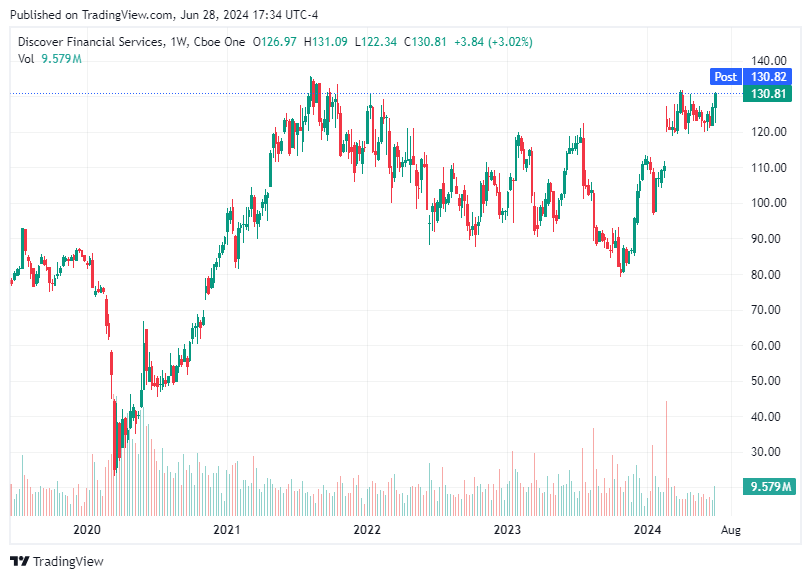Discover Financial (DFS): Just forget about Visa and Mastercard
This smaller credit card company ranks higher based on yield, dividend growth and buybacks
Discover Financial Services: Crazy dividend growth and buybacks
The second focus stock published on dividendhike.substack.com is Discover Financial Services (DFS), a renowned financial services company with a storied history and a robust presence in the credit card and banking industries.
Everybody seems to love the giants Visa and Mastercard, but actually Discover Financial, a 2024 dividend hero (more on this later….), has way better stats if we look at the dividend and buybacks. Discover Financial hiked its dividend by 16.7% in 2023, marking 13 consecutive years of increases. This compares to a 15.8% hike by Mastercard (MA) last year and a 15.6% increase by Visa (V) in 2023.

Moreover Discover Financial, trading near its all time high, has a 2.3% dividend yield vs. 0.8% for Visa and 0.6% for Mastercard. We can continue with valuation stats, all in favour of Discover Financial with an estimated p/e of 13 based on Today’s closing price of $130.81.
Last but not least we look at buybacks with DFS retiring about 47% of its shares in the last decade vs. 21.5% for Mastercard and 21.1% for Visa. Both Visa and Mastercard repurchased 2.5% of its shares in 2023 vs. 8.5% for Discover Financial. So together with a better yield and dividend growth DFS also ranks higher based on buybacks.
Comparative Analysis: Visa, Mastercard, and Discover Financial
Dividend Yield and Total Return
Visa (V):
Yield: 0.8%
Total Return: 2.8%
Mastercard (MA):
Yield: 0.6%
Total Return: 4.1%
Discover Financial (DFS):
Yield: 2.3%
Total Return: 11.3%
Analysis: Discover Financial stands out with the highest dividend yield at 2.3%, significantly higher than Visa and Mastercard. Moreover, Discover also boasts the highest total return at 11.3%, showcasing strong performance in comparison to its peers.
Market Capitalization
Visa (V): $525 billion
Mastercard (MA): $410 billion
Discover Financial (DFS): $33 billion
Analysis: Visa leads with the largest market cap, followed by Mastercard. Discover Financial has a much smaller market cap, indicating it is a smaller player in the market compared to the other two giants.
Dividend Growth
Hike Years:
Visa: 15 years
Mastercard: 11 years
Discover Financial: 13 years
5-Year CAGR (Compound Annual Growth Rate):
Visa: 15.8%
Mastercard: 14.9%
Discover Financial: 11.8%
Analysis: Visa has the longest streak of dividend hikes and the highest 5-year CAGR, indicating strong and consistent dividend growth. Mastercard follows closely, while Discover, although having a respectable CAGR, lags behind Visa and Mastercard.
Dividend Hikes Over Recent Years
Visa:
2023: 15.60%
2022: 20.00%
2021: 17.19%
Mastercard:
2023: 15.80%
2022: 16.33%
2021: 11.36%
Discover Financial:
2023: 16.70%
2022: 20.00%
2021: 13.64%
Analysis: All three companies have shown strong dividend hikes in recent years. Discover Financial and Visa both had a 20% hike in 2022, with Discover leading slightly in 2023. Mastercard, while showing strong hikes, has lower increases compared to the other two.

Conclusion
Visa and Mastercard, as larger entities with significant market caps, offer robust dividend growth and stable returns, making them strong choices for investors seeking growth and stability. Discover Financial, with a higher yield and total return, presents a compelling option for those looking for income and potentially higher returns, albeit with the understanding that it operates on a smaller scale compared to Visa and Mastercard.
Key Takeaways:
For Growth and Stability: Visa and Mastercard are top choices, with Visa slightly edging out Mastercard in terms of CAGR and years of dividend hikes.
For Income and High Returns: Discover Financial stands out due to its higher yield and total return, making it an attractive option for income-focused investors.
Each of these companies offers distinct advantages, catering to different investor needs and preferences.
History of Discover Financial Services
Discover was launched by Sears in 1985, emerging as a disruptor in the credit card industry with its unique value propositions. Unlike many credit cards of the time, Discover offered no annual fee and cashback rewards on purchases, features that were groundbreaking at the time. The company rapidly gained traction, and in 1986, it was introduced to the public during Super Bowl XX with a high-profile ad campaign.
In 1993, Sears spun off its financial services arm, which included Discover, forming a new company named Dean Witter, Discover & Co. This entity later merged with Morgan Stanley in 1997. By 2007, Discover Financial Services was spun off as an independent publicly traded company. Since then, Discover has diversified its offerings and expanded its footprint, becoming a major player in the financial services sector. This February Capital One announced a $35 billion deal to buy Discover Financial but its not sure if regulators will approve this acquisition that is still pending.
Current Business Operations
Today, Discover operates through two primary segments: Direct Banking and Payment Services.
Direct Banking: This segment includes Discover-branded credit cards, personal loans, student loans, home equity loans, and deposit products. Discover's credit cards are known for their generous cashback rewards, no annual fees, and robust customer service. The company also offers competitive rates on savings accounts, certificates of deposit, and money market accounts.
Payment Services: Discover operates the Discover Network, which processes transactions for Discover cardholders. Additionally, it manages the PULSE network, one of the leading ATM/debit networks in the U.S., and Diners Club International, a global payments network with acceptance in more than 185 countries.
Strengths of Discover Financial Services
Discover has several key strengths that underpin its business:
Innovative Product Offerings: From its inception, Discover has been known for innovation in product offerings, particularly its rewards programs and fee structures, which continue to attract and retain customers.
Customer Satisfaction: Discover consistently ranks high in customer satisfaction surveys, thanks to its focus on customer service and user-friendly products. This loyalty is a significant competitive advantage.
Strong Financial Position: Discover maintains a strong balance sheet with prudent financial management. This enables the company to invest in new technologies and services while returning value to shareholders through dividends and buybacks.
Diversified Revenue Streams: The company's dual focus on Direct Banking and Payment Services provides a diversified revenue base, reducing dependence on any single line of business.
Competitive Landscape
Discover operates in a highly competitive industry, facing challenges from both traditional financial institutions and new fintech entrants. Major competitors include:
Credit Card Issuers: Discover's primary competitors in the credit card space are giants like Visa, MasterCard, American Express, and JPMorgan Chase. These companies compete aggressively on rewards, fees, and interest rates.
Banks and Credit Unions: Traditional banks and credit unions offer similar banking products, often leveraging their extensive branch networks and established customer bases to attract clients.
Fintech Companies: The rise of fintech has introduced new competition in areas like personal loans, student loans, and payments. Companies like SoFi, LendingClub, and PayPal are notable competitors in this space.
Payment Networks: In the payment services segment, Discover competes with other major networks such as Visa, MasterCard, and American Express. The competition here is based on transaction fees, network acceptance, and technological innovations.
Discover Financial's moat compared to Visa and Mastercard
A moat, in business terminology, refers to a company's ability to maintain a competitive edge over its rivals in order to protect its long-term profits and market share. This concept, popularized by Warren Buffett, suggests that a company with a strong moat can fend off competitors and sustain profitability over time. Moats can be built from various factors, including brand strength, network effects, cost advantages, regulatory advantages, or intellectual property.
Discover Financial Services (DFS)
Closed-Loop Network:
Unique Model: Unlike Visa and Mastercard, which operate open-loop networks (acting as intermediaries between banks and merchants), Discover runs a closed-loop network. This means Discover handles the entire transaction process, including issuing cards, managing the network, and processing payments.
Control Over Entire Transaction: This allows Discover to have direct relationships with both cardholders and merchants, potentially leading to better customer service and higher profit margins from not having to share fees with issuing banks.
Direct Banking Services:
Diversified Financial Products: Discover offers a range of financial products, including personal loans, student loans, and online savings accounts. This diversification can provide cross-selling opportunities and customer retention through integrated financial services.
Cost Structure:
Potential Cost Savings: Operating a closed-loop network can sometimes result in lower operational costs compared to the open-loop model used by Visa and Mastercard, where multiple entities are involved in the transaction process.
Visa and Mastercard
Network Effects:
Ubiquity and Acceptance: Visa and Mastercard have extensive global acceptance and are used by millions of merchants worldwide. Their networks are far more extensive than Discover's, creating a significant advantage in terms of consumer and merchant adoption.
Interoperability: Their open-loop systems facilitate transactions across a vast number of banks and financial institutions, making them highly versatile for both domestic and international transactions.
Brand Strength:
Global Recognition: Both Visa and Mastercard enjoy strong brand recognition and trust worldwide, further solidifying their position in the market.
Scale and Reach:
Volume of Transactions: The sheer volume of transactions processed by Visa and Mastercard provides them with massive amounts of data and insights, which can be leveraged to improve services, security, and efficiency.
Partnerships with Financial Institutions:
Wide-Ranging Partnerships: Their business model involves partnering with numerous banks and financial institutions, enabling them to expand their network rapidly and maintain a dominant position.
Conclusion
Discover Financial Services has a rich history of innovation and customer-centric offerings that have positioned it as a significant player in the financial services industry. Its strengths in product innovation, customer satisfaction, financial stability, and diversified revenue streams provide a solid foundation for future growth. However, the competitive landscape remains fierce, with challenges from established financial institutions and nimble fintech startups. As Discover continues to evolve, it will need to leverage its strengths and innovate continuously to maintain its competitive edge.
For investors and consumers alike, Discover's blend of traditional banking services and modern financial solutions make it a company worth watching.
Please let us know in the comments below which stock you prefer; Visa, Mastercard or Discover Financial, our new Focus stock.
Disclaimer: The information provided here is for informational purposes only and should not be considered financial advice. Investors should conduct their own research or consult with a financial advisor before making any investment decisions.




I prefer to hold Visa or MC, neither of which carry the credit risk of the cardholders. This helps balance the credit risk side in my bank holdings.
$DFS is up 5.4% Today nearing its all time high!